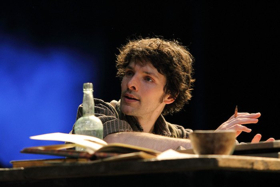Review: TRANSLATIONS, National Theatre

![]() It begins with deep breathing, in order to access words that hold unimaginable power. And Ian Rickson's exquisite production of Brian Friel's masterpiece maintains that space throughout: for words to breathe and simmer, to hang in the air, and for us to understand how vital language is not just as a means of communication, but identity, nationality, and a rich heritage at risk of extinction.
It begins with deep breathing, in order to access words that hold unimaginable power. And Ian Rickson's exquisite production of Brian Friel's masterpiece maintains that space throughout: for words to breathe and simmer, to hang in the air, and for us to understand how vital language is not just as a means of communication, but identity, nationality, and a rich heritage at risk of extinction.
Friel's play is set in 1830s Ballybeg, in rural Ireland. Hugh and son Manus run a hedge school, but a new national school is about to move in - one where English will be spoken and taught, instead of Hugh's preferred mix of Gaelic, Ancient Greek and Latin. Is this removing a barrier to progress, or the erosion of something fundamental?
Initially bridging the divide is Hugh's other son Owen, returning home after six years' absence. He's been employed by the British Government to help survey the land and create a new map - an enterprise fraught with colonial undertones, as Irish place names become Anglicised.
Friel makes the inspired choice to have all the actors speak English, but have it represent both languages - so that they seem to talk to one another, yet are separated by some intrinsic difference. It also speaks to the terrible inevitability of English becoming dominant, even as it's used here to argue that it could never describe the Irish soul, or match Gaelic's poetry.
In the midst of this conflict is a burgeoning star-crossed romance. Maire, the tentative sweetheart of the frustrated Manus - whose father snatches away his chance at career advancement, leaving her contemplating a solo passage to America - forms a connection with Lieutenant Yolland, even though neither understands the other's language.
Yet the unknown becomes exotic, seductive; Maire reels off English place names like a summoning, and both circle around the binding word "always". But this love found "outside the tribe" is soon threatened by both literal and figurative gathering storm clouds; Eden becomes a sodden battlefield.
Friel wrote the play in the midst of the Troubles, and a different but still resonant political context surrounds it now. Northern Ireland's power-sharing government breakdown is in part due to Sinn Féin's demand for an Irish Language Act giving Gaelic the same legal status as English, and the play features the British imposition of borders - Brexit comparisons are inevitable.
But there's also something mythic and universal about Friel's piece, which gets at the root of language; not for nothing are its Irish characters etymology fiends. It winds its lyrical way through cultural expression, lands steeped in legends, evocation and the repeating patterns of history.
And it's vital to a sense of self. Owen - mistakenly called "Roland" by his English colleagues - tries to dismiss the error by saying "it's still the same me". But his studied blindness is soon challenged, as he goes from crafty mediator making diplomatic translation to dangerously unmoored. Can someone with a foot in both worlds really belong to either?
Colin Morgan confidently conveys the opportunistic Owen's easy charisma, and its miserable souring, while Seamus O'Hara is excellent as the put-upon but perceptive Manus, and Ciarán Hinds a commanding presence as the drunken schoolmaster clinging to the past.
Adetomiwa Edun is wonderfully endearing as Yolland, boyishly thrilled by immersion in his romanticised idyll, and Judith Roddy delicately peels away the protective layers of the weary, pragmatic Maire, who seems giddily light in his presence.
There's great support too from Dermot Crowley's twinkling, Athena-loving Jimmy, Aoifa Duffin's gossipy Bridget, Rufus Wright's condescending Captain, Laurence Kinlan's doltish Doalty, and Michelle Fox's Sarah - the latter who struggles to speak at all, and is thus rendered powerless.
Rae Smith supplies a gorgeously detailed, loamy set, and the Irish characters' earth-toned, well-patched clothes seem an organic part of it; the bright-red invaders' uniforms stand out like blood streaks.
Stephen Warbeck's score is superbly judged, and Neil Austin's lighting is revelatory. The landscape really does seem to shift from day to night, season to season, the mists coming alive and colouring the emotional landscape too.
A clever climactic image nods towards a dark future, hinted at here via the guerrilla tactics of the unseen Donnelly twins, and fearful talk of famine and hardship. The classical literature beloved of Hugh and Jimmy frames this in epic terms, yet the triumph of Rickson's production is its tender, funny and heart-wrenching intimacy.
Translations at National Theatre until 11 August
Photo credit: Catherine Ashmore
Reader Reviews

Videos

